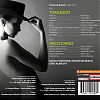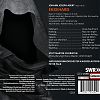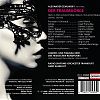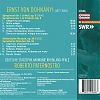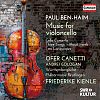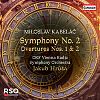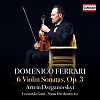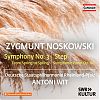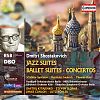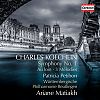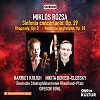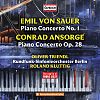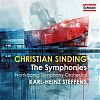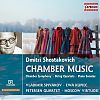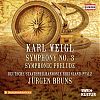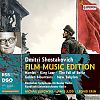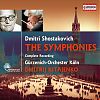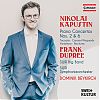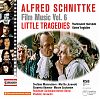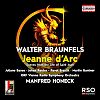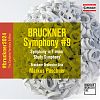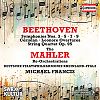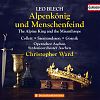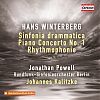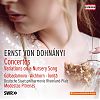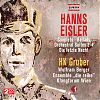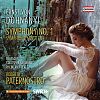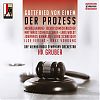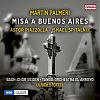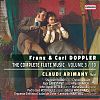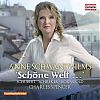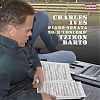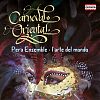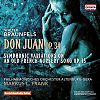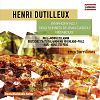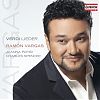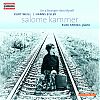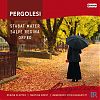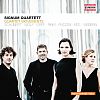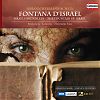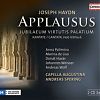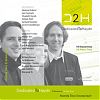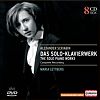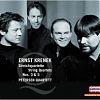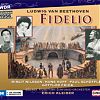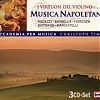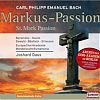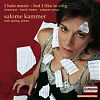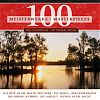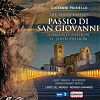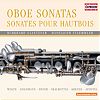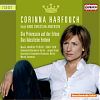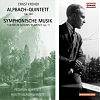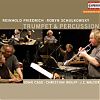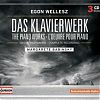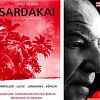cd

NIKOLAI KAPUSTIN: SAXOPHONE CHAMBER MUSIC
clair-obscur Saxophonquartett
Quintet for saxophone quartet and piano, Op. 89a
(authorized version of piano quintet op. 89 by Christoph Enzel)
Quartet for 4 saxophones, Op. 88a
(authorized version of string quartet op. 88)
Duo for alto saxophone and cello, Op. 99
At first glance, it might be surprising that a pianist born in the Soviet Republic of Ukraine, who went through the classical Russian school of pianists, should compose exclusively in the idiom of jazz. But jazz was more prevalent in the Soviet Union that might be supposed. Already in the 1930s, Oleg Ludstrem began appearing with his Big Band touring in the UDSSR. Later, Nikolai Kapustin worked for many years in this orchestra as a pianist and arranger. ‘What interests me most is the fusion between classical music and jazz, and between the classical form and the jazz idiom. Here, the classical portion has more weight for me. The jazz style is merely colour.’ (Nikolai Kapustin).
Weitere Bilder

FERRUCCIO BUSONI: TURANDOT // ARLECCHINO
RADIO-SINFONIE-ORCHESTER BERLIN · GERD ALBECHT
Busoni never came closer to his dream of Italian music than with that night on May 11 1917 of double performance in Zurich, which he calls himself "La Nuova Commedia dell' Arte" I ("Turandot") and II ("Arlecchino"). In the unusually short time from December 1916 to March 1917 Busoni reworked the already existing material to the Incidental Music of Gozzis "Turandot" into an opera. This happen 4 years before Puccini started to work on the same contend. "Arleccino", though in immediate neighbourhood to "Dr. Faust" looking almost like a secondary work, is perhaps the composer's actual key work. The speaking hero of his "theatralische Capriccio" represents a role model, which is at times more important to him than his aesthetic Faust, especially as the the World War increases.
Weitere Bilder

JOHANN JOSEPH ABERT: EKKEHARD
SWR RUNDFUNKORCHESTER KAISERSLAUTERN · PETER FALK
The fate of the lovesick monk Ekkehardunfolds against the historical background of the battle againstheathenismandtheHunnishinvasion -things which the broad and lavish grand-opera framework not only justifies but virtually demands.Abert set this very motley text to music in such a way that each of the various worlds and situations is given its appropriate expression, emulating "just about all the styles represented in opera today". However, his approach is not one of simple eclecticism; the entire work is set in the fully individual tonal language he had developed in his previous operas.The young tenor Jonas Kaufmann with his brilliant tembre had the best requirements to present the main-role in this nearly unknown opera. This production was one of the first recordings in general for him, now re-mastered and new released again.
The fate of the lovesick monk Ekkehardunfolds against the historical background of the battle againstheathenismandtheHunnishinvasion -things which the broad and lavish grand-opera framework not only justifies but virtually demands.Abert set this very motley text to music in such a way that each of the various worlds and situations is given its appropriate expression, emulating "just about all the styles represented in opera today". However, his approach is not one of simple eclecticism; the entire work is set in the fully individual tonal language he had developed in his previous operas.The young tenor Jonas Kaufmann with his brilliant tembre had the best requirements to present the main-role in this nearly unknown opera. This production was one of the first recordings in general for him, now re-mastered and new released again.
Weitere Bilder

ZEMLINSKY: DER TRAUMGÖRGE
RADIO-SINFONIE-ORCHESTER FRANKFURT · GERD ALBECHT
"He was too modern for the conservatives, and he did not manage to catch up with the 'New
Music', despite his close personal relationship to Schönberg" – This brief characterization of Zemlinskys compositional style shows that the composer 'feil between two stools' even while he was alive. The opera was written at the suggestion of Gustav Mahler between 1903 and 1906. In 1907 he was engaged by Mahler as director of music at the Court Opera; at the same time, his third opera "Der Traumgörge" (Görge the Dreamer) was accepted for its first performance. Following Mahler's resignation, however, the opera was dropped by Mahler's successor, even though it had already been rehearsed, and it stayed untouched till the 1970s when the scores and parts have been found in the archive of Vienna State Opera. It's time that this recording – who was the first complete recordings – as well as Zemlinsky's masterpiece turn back to the awareness of the musical life.
Weitere Bilder

ERNST VON DOHNANYI (1877-1960)
DEUTSCHE STAATSPHILHARMONIE RHEINLAND-PFALZ · ROBERTO PATERNOSTRO
The Symphony No. 1 in D minor op. 9 belongs to Dohnányi’s early years of success.
Among all the influences of the late Romantic tradition, that by Brahms’ music can be discerned here once more. From it, Dohnányi forms a kind of early Neo-Romanticism that can be viewed as a continuation of the 19thcentury while avoiding the Expressionist, sprawling violence of the beginnings of Modernism in the 20thcentury. Reminiscent of Mahler and Strauss is the sovereign treatment of the large orchestra, in which many details stand out, making a major contribution towards the quality of the work. The Symphonic Minutes op. 36 was written in 1933 in the context to compose a Hungarian dance game. With this CD Capriccio starts a new Edition with recordings of these still less known but powerful Music from the hungarian Composer Ernst von Dohnanyi.



